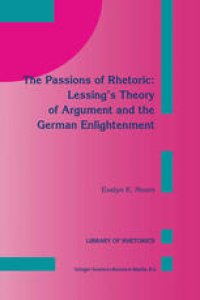
Ebook: The Passions of Rhetoric: Lessing’s Theory of Argument and the German Enlightenment
Author: Evelyn K. Moore (auth.)
- Tags: Philosophy, Social Sciences general, History
- Series: Library of Rhetorics 3
- Year: 1993
- Publisher: Springer Netherlands
- Edition: 1
- Language: English
- pdf
The goal of this book is to ascertain Lessing's views on argumentation and rhetoric. I intend to establish that these views constitute a systematic and coherent theory and to argue that for Lessing rhetoric in argument can yield philosophical truth. Analysis of Lessing's views also sheds light on the general significance of rhetoric in the 18th century. The denial that rhetoric has claims to truth is a long-standing prejudice of Western thought. This position is evident in Kant's rejection of rhetoric in philosophical discourse. But in my view, the situation in the 18th century in Germany was somewhat more complex. Rhetoric did not die a quiet death but was very much alive in polemical tracts, and Lessing was a pivotal figure in a culture dominated by argument and disputation. I asked myself why and how this polemical age came to an end and how does the rejection of polemics by the 19th century affect our understanding of the 18th century? In the Introduction, I address some of these questions and establish a historical framework for the development of polemics in the 18th century. Another reason this polemical age has traditionally been seen as problematic for the scholars of the period is because argument, disputation and debate cannot be submitted to the same easy analysis as the systematic treatises produced at the end of the century.
The Passions of Rhetoric reveals Lessing's contribution to the history of rhetoric and his participation in the long-standing debate between philosophy and rhetoric. - Attempts a reassessment of the importance of rhetoric to argumentation in the 18th century. - Establishes that Lessing developed his own views on rhetoric and argumentation and that these views were opposed to the anti-rhetorical position of other 18th century intellectuals, including Kant. - The few treatments of Lessing's polemical writings that have appeared in the last few years concentrate on the practice of rhetoric and not on Lessing's own views on language and argument. Moore's work, on the other hand, combines both an interest in style of argument and the philosophy which informs it, a rich tradition going back to the ancient Greeks.
The book is required reading for students of European rhetoric, 18th century German critical writing, 18th century polemics on theatre and theology. All quotations in German have been translated into English to inform a wider audience.